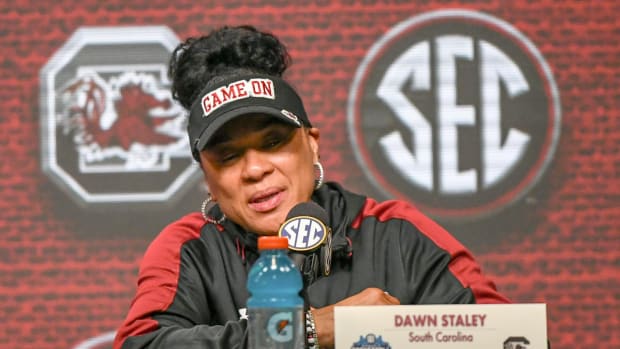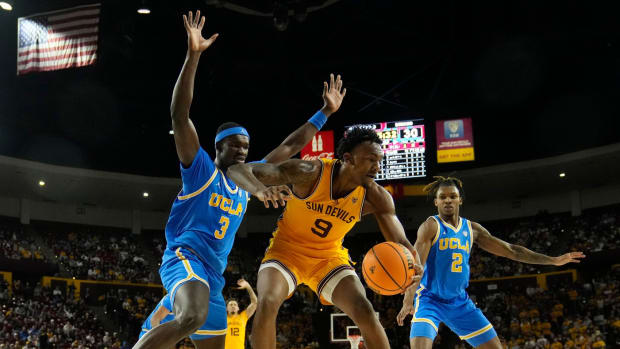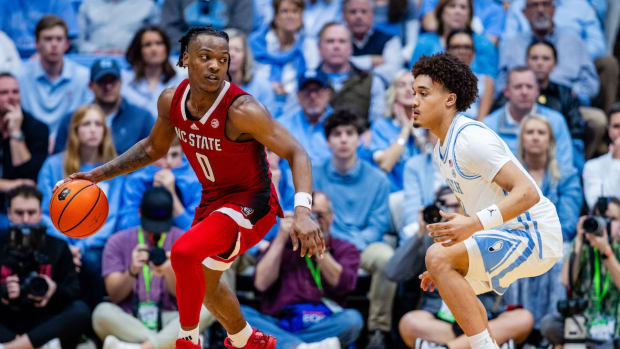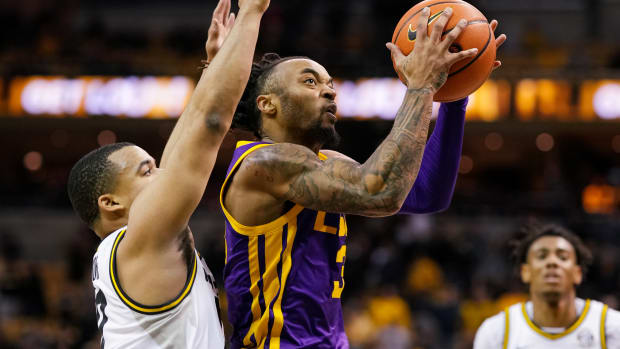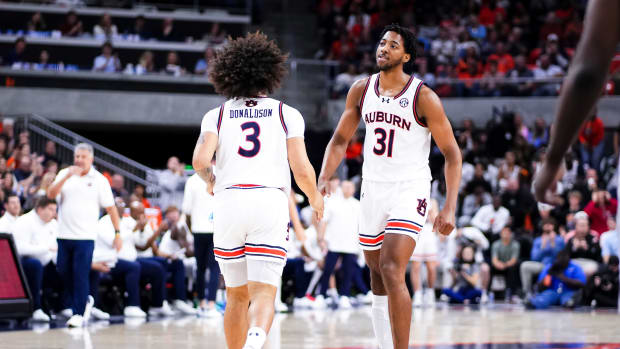New Notre Dame Coach Niele Ivey Is Carrying on Muffet McGraw's Legacy While Building Her Own
When Niele Ivey found out she was the new head coach of the Notre Dame women’s basketball team in April 2020, the first thing she did was check in with her former coach, mentor and friend, Muffet McGraw. “I was like, Are you really done? Are you retired? Like, you're good?” Ivey says. “I was more concerned about her. I wanted to make sure that she was comfortable.” On the phone that day, McGraw reassured Ivey that yes, after 33 years at the helm for the Fighting Irish, she was indeed retiring.
The news came as a shock to basketball fans around the country, but McGraw had contemplated the decision for years. Notre Dame athletic director Jack Swarbrick was the only other person who knew her timetable. More than a year ago, the two spoke candidly about how to maintain the women’s basketball program at an elite level after her departure. “We both just felt really strongly that Niele was the logical successor,” Swarbrick says, adding that there was a written understanding that Ivey would succeed McGraw. “In fact, it was one of the things that caused us both to be so encouraging when the NBA opportunity came along. We saw it sort of as a sabbatical. Go learn more basketball and then come back to us.”
After 17 seasons at Notre Dame as a player and an assistant coach, and a year as an assistant coach with the Memphis Grizzlies, Ivey, 43, is now the face of a college program that boasts a whopping 24 consecutive NCAA tournament appearances, nine Final Fours and two national championships. In her new role at Notre Dame, Ivey also became the school’s first Black woman head coach in any sport.
McGraw and Ivey’s relationship can be traced back to the mid-1990s, when the then Notre Dame coach came to Cor Jesu Academy in St. Louis to see a teenager who was breaking records for points, rebounds, assists, steals and blocked shots, and leading her team to their first state championship in school history. Ivey’s mom, Theresa, knew she had to impress McGraw on the visit, so she did what anyone would do: She baked her a pound cake. Later, when Ivey arrived on Notre Dame’s campus for her official visit, her mom packed another pound cake in her suitcase for her to give McGraw. Ivey walked off of her flight wearing suspenders, bearing a pound cake. The two still laugh about the incident.
“I was so embarrassed,” Ivey says.
“Well, it got her a scholarship, so it's well worth it,” McGraw says. “It was excellent. She is quite the baker.”
With an assist from the pound cake, Ivey earned a spot at Notre Dame. McGraw felt confident recruiting Ivey because of her skill, but also because she fit in with the team’s culture. When McGraw was appointed head coach of the program in 1987, the team was only 10 years old, and she was tasked with building a program. Early on in her tenure, McGraw learned her hardest recruiting lesson: Don’t just recruit talent. It's about the chemistry of the team. Finding players who fit within the Notre Dame ethos was paramount.
“I think from the moment that I met Niele and had the opportunity to start coaching her as a freshman, she was just somebody special,” McGraw says. “And I knew that she was one of those people that is just going to be a part of my heart forever.”
McGraw admired Ivey’s competitiveness, boss-like attitude and leadership skills, especially when it came to her position—the same one McGraw played in college at St. Joseph’s and in the WPBL. “When you're the point guard, first of all, you have to be pretty tough because everything that goes wrong is your fault. You have to be somebody that can accept responsibility and be accountable not just for yourself, but for the whole team,” McGraw says. “She was a great director. She was in charge. She was the maestro that led us to the national championship. She had just so much knowledge and a great IQ. … You can't teach that. You just have to have that innate knowledge of the game. And she definitely had that.”
Ivey’s play at point guard during her fifth year helped bring home Notre Dame’s first national championship in 2001. After graduating, Ivey enjoyed a stint in the WNBA with the Indiana Fever, Phoenix Mercury and Detroit Shock before she retired and became an intern at Xavier. When McGraw called her in 2007 and asked whether she wanted to come back to South Bend to be an assistant coach, Ivey did not hesitate. “For me, that was my dream job because I really wanted to coach,” Ivey says. “And what better way to start my coaching career than to have the opportunity to coach under Coach McGraw, to be back in my alma mater?” Since rejoining the Irish in ‘07, the two have coached a total of 57 NCAA tournament games together, amassing a 45–12 record and winning a national championship. They've also created a pipeline to the WNBA, coaching future league stars like Skylar Diggins-Smith, Jewell Lloyd, Arike Ogunbowale and more.
The Irish went 386–55 (.875) during Ivey’s time as an assistant, when she spent her time soaking up every drop of knowledge from McGraw like a sponge, from how to run practices to play-calling and more. Her skills on the recruiting trail made an impression on McGraw, too. “Really the face of the program,” McGraw says of Ivey. “Kids loved her. Who wouldn't want to play for her? She was just such a big part of everything that I did and a big part of everything that we accomplished. So it was really just a perfect fit.”
McGraw undoubtedly sees some of her own competitive edge in her successor, but in other aspects, their personalities diverge. “I'm warm and fuzzy. I'm a relationship-driven person,” Ivey says. “I'm like the emotional one—I know how to be strong and how to keep our emotions in check when I need to.”
McGraw agrees. “She hit the nail on the head,” she says. “Warm and fuzzy versus … I don't want to say cold. Definitely just the facts.”
When it comes to facts, particularly about women’s rights, McGraw is well informed. She knows what year the Equal Rights Amendment was introduced and how many states have ratified it. She knows how many elected members of the House of Representatives are women. She knows which percentage of Fortune 500 companies have female CEOs. She knows how many female athletic directors are in D-I basketball. McGraw can and will recite these facts to you, like she did during a press conference during the 2019 Final Four in Tampa when asked about being a “voice” in women’s basketball. Her response has been viewed by millions of people. Barack Obama retweeted it. Hilary Clinton sent her a handwritten note.
Women’s basketball is well known for its ties to activism. To be a woman in sports, whether as a player, coach, or media member, is to be inextricably tied to issues of equality. Access to resources that men have, salaries that men receive or attention that men demand are issues of politics that women do not have the privilege to ignore. Long before her famous Final Four video, McGraw’s coaching playbook included lessons of empowerment and equality, and she believes strongly in the lessons that sports can teach. “I think it's so important for women, especially, to be able to use their voice and they have to be able to fight for what they believe in,” she says.
McGraw’s role as a voice within college basketball on these issues is another that Ivey is well-positioned to fill, if she chooses to. “She's the one that has really propelled [me] to have the confidence to use my voice. … I learned so much from her and her activism and just her fight for women's equality,” Ivey says. “If there was a female leader that was on campus, she brought them to speak to the team or speak to the staff. It's helped guide the way that I'm coaching because of the example that she set for me.”
During her time with the Grizzlies, Ivey had to adjust—to a longer season, to the inevitability of losing, to the lack of recruiting. “The NBA was just all basketball. I was always like, This is all ball. No recruiting. All basketball,” she says. “[NBA players] do a really good job of just bouncing back from games. Like the first game we lost, I was just like, ‘Oh my gosh, I can't believe we just lost that game.’ And then they're like, ‘We have 81 more games.’”
Since returning to Notre Dame this spring amid the coronavirus pandemic, Ivey has had to guide the team through some unusual circumstances. Instead of in-person visits to the Notre Dame campus, players must be recruited through Zoom and coaches cannot travel to see high school games. Ivey has also led the team through understanding and reacting to the police killing of George Floyd, which sparked national conversations about racism and police brutality.
“Going through the uncertainty of the pandemic and then the frustration and emotional backlash from all the protests and everything that's going on in our world with the civil unrest … that's been really, really challenging,” she says. “I've had to really adjust the way that I coach just making sure that the team knows that there is a lot of support.” She says conversations about mental health and making sure that players are O.K. outside of basketball are crucial, especially this summer when they were not allowed to meet in person.
In 2014, Notre Dame women’s basketball became the first women’s basketball team to wear shirts during warmups that said “I can’t breathe” to protest the police killing of Eric Garner. “We got a lot of flack from that, a lot of negative backlash,” Ivey recalls. “And I was super proud that Coach McGraw stood up for the team and allowed them to be passionate about that racial injustice and to stand up for what they felt was right.”
Ivey, who has a Black son, stresses the importance of the Black Lives Matter movement. “The fact that I have to worry every day ... about him being in the wrong place at the wrong time. It's very emotional for me as a mother,” she says. “And it's just very frustrating to know that this is continuing to happen over and over again, and nothing has changed.”
Both Ivey and McGraw believe that one thing that has changed is athletes’ willingness to use their voice. “I think this generation has a great sense of social conscience, and I think it's one that's incredibly inclusive,” McGraw says. “I think as each generation progresses, we get more and more inclusive.”
Since retiring in the spring, McGraw has stayed busy, giving interviews, talking at seminars and teaching a course at Notre Dame called Sports Leadership: How Leaders Make Teams Flourish. Since the pandemic began, she has helped the South Bend community by assisting with more than 117,000 pounds of food donations. And McGraw still uses her social media feed to spread awareness about important issues—just one example: On Oct. 8, McGraw tweeted a photo of herself voting early, with a T-shirt that read, “This nasty woman votes.” (The interview with McGraw and Ivey occurred prior to the nomination of ND Law professor Amy Coney Barrett to the Supreme Court.)
McGraw believes that the pandemic helped her ease into retirement, but it’s not the same without practices with the team. “I miss the camaraderie,” she says. “I miss going into our meetings every day and laughing, even when we were having some bad times and lamenting the fact that even though we were 21–0, we still weren't perfect and things weren't going well. I'm gonna miss all of that. It'll be hard to be a spectator.”
The McGraw era at Notre Dame is over, but her stamp on the program remains intact. On road trips, in meetings, and at practices, Ivey will forge her own legacy at Notre Dame, but McGraw will not be completely cut off from the program. Ivey plans to use her as a resource, picking her brain often. She has no qualms about taking advantage of having a Hall of Fame coach down the street. The two care deeply about each other. They have experienced much of basketball’s joys and sorrows together. They have spent much of their lives alongside one another.
In a world that demands so much of its female leaders, often much more than their male counterparts, McGraw and Ivey lead by example.
For more from stories on the most powerful, most influential and most outstanding women in sports right now, check out Sports Illustrated's series The Unrelenting.





